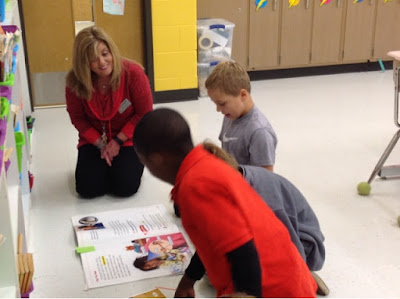Teachers throughout the district are expecting students to read and comprehend text that is much more rigorous than what has been taught in the past. Teachers aren't just handing out harder books. Teachers are reading and studying, themselves, so that their instruction will provide the necessary support students need in order to read and comprehend rigorous texts. Kindergarten through fifth grade reading teachers are using Lucy Calkins' Units of Study for Teaching Reading to guide their instruction.
Last week at Magnolia Elementary, Dr. Jeter, Kelly McGough (reading coach), and I observed a reading lesson in Teresa Biven's second grade classroom. Second grade teachers have recently introduced their nonfiction unit, a critical component of reading instruction. According to Doug Lemov, author of Reading Reconsidered, reading more nonfiction is important, but reading nonfiction more effectively in a way that unlocks knowledge and increases engagement and appreciation is just as important. Because reading nonfiction requires very different skills than those necessary for reading fiction, Mrs. Bivens began by asking her students to examine shiny pennies, while noting what they noticed, wondered, and learned through their careful examination. It was amazing to hear the students ask about the dates on their pennies, why Lincoln was not wearing his hat, what building is on the back of the penny, etc.
Next, Mrs. Bivens divided students into small groups and asked them to go to four stations that included a model of a heart, a map of Trussville, a globe, and nonfiction big books. The objective was to notice, wonder, and learn by carefully examining the objects and texts. Again, it was surprising to see how much the students could learn on their own through deliberate, careful exploration and attention to details.
Finally, students were provided bins of books that were appropriate for their reading levels and asked to pick a book to carefully read and examine. Again, students were expected to notice, wonder, and learn as they applied these reading skills to an interesting nonfiction book.
The lesson was an example of the effective lessons that are being planned and implemented throughout the district. Mrs. Bivens provided a thoughtful, challenging lesson that began with a student-friendly learning target, based on standards. Academic vocabulary words (i.e. examine and analyze) were introduced to the students. Instruction was differentiated by the provision of books based on individual reading levels. Throughout the lesson, student and teacher discourse was evident, as well as student to student discourse. Students were engaged throughout the lesson with very few distractions because expectations and procedures were clear and in place. Best of all, the culture of the classroom was academic and positive. It was obvious that the students valued learning and were willing to commit their time and attention to the tasks in order to learn.
Many thanks to Mrs. Bivens for sharing her classroom to administrators as we learn together.
The learning target (above) was reviewed with students at the start of the lesson and referred to throughout the lesson.
Mrs. Bivens created a PowerPoint to help guide her instruction.
Students were given pennies to examine and asked to notice, question, and learn.
Students examined a map of Trussville.
Students explored a globe.
Mrs. McGough listened as students read nonfiction text.
Dr. Jeter observed students who examined a life-size model of the heart.
Instructions were clearly shared with students.
Bins of books were assembled prior to the lesson to provide "just right" levels of nonfiction books for all students.
Students read independently, noting things they noticed, questions, and new learning.













What a phenomenal lesson by an extraordinary teacher. I love seeing the work we're discussing about literacy move from district-level, to school-level, to classroom level because this is how our literacy goals will be reached. I'm so proud of our reading coaches and teachers being intentional about students' reading, discussing, and writing about rigorous texts.
ReplyDelete